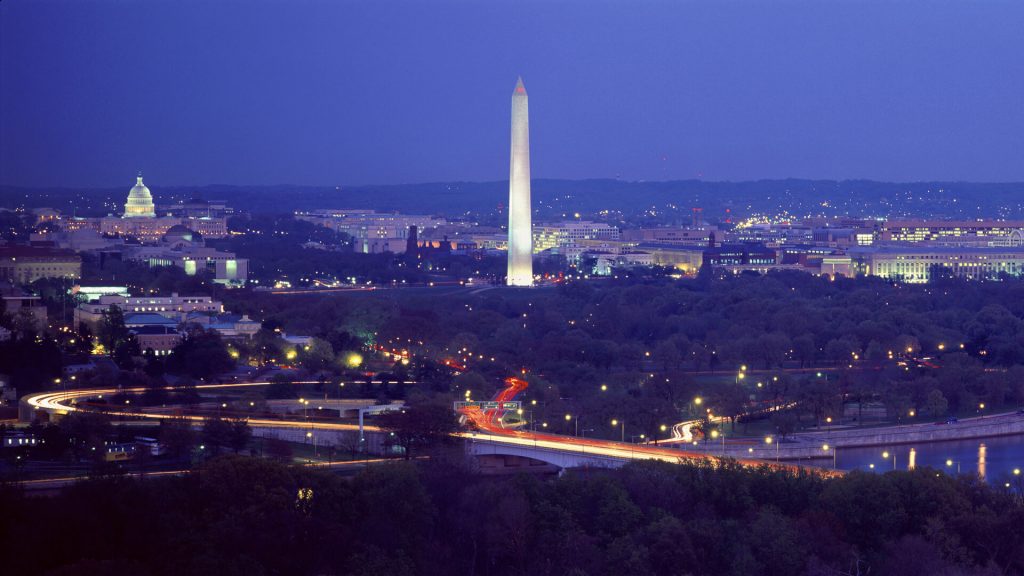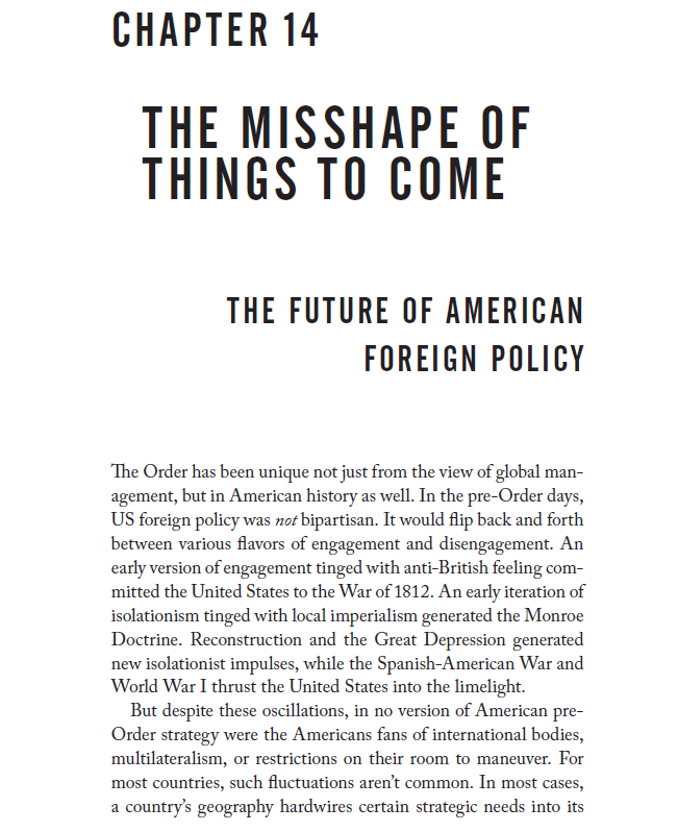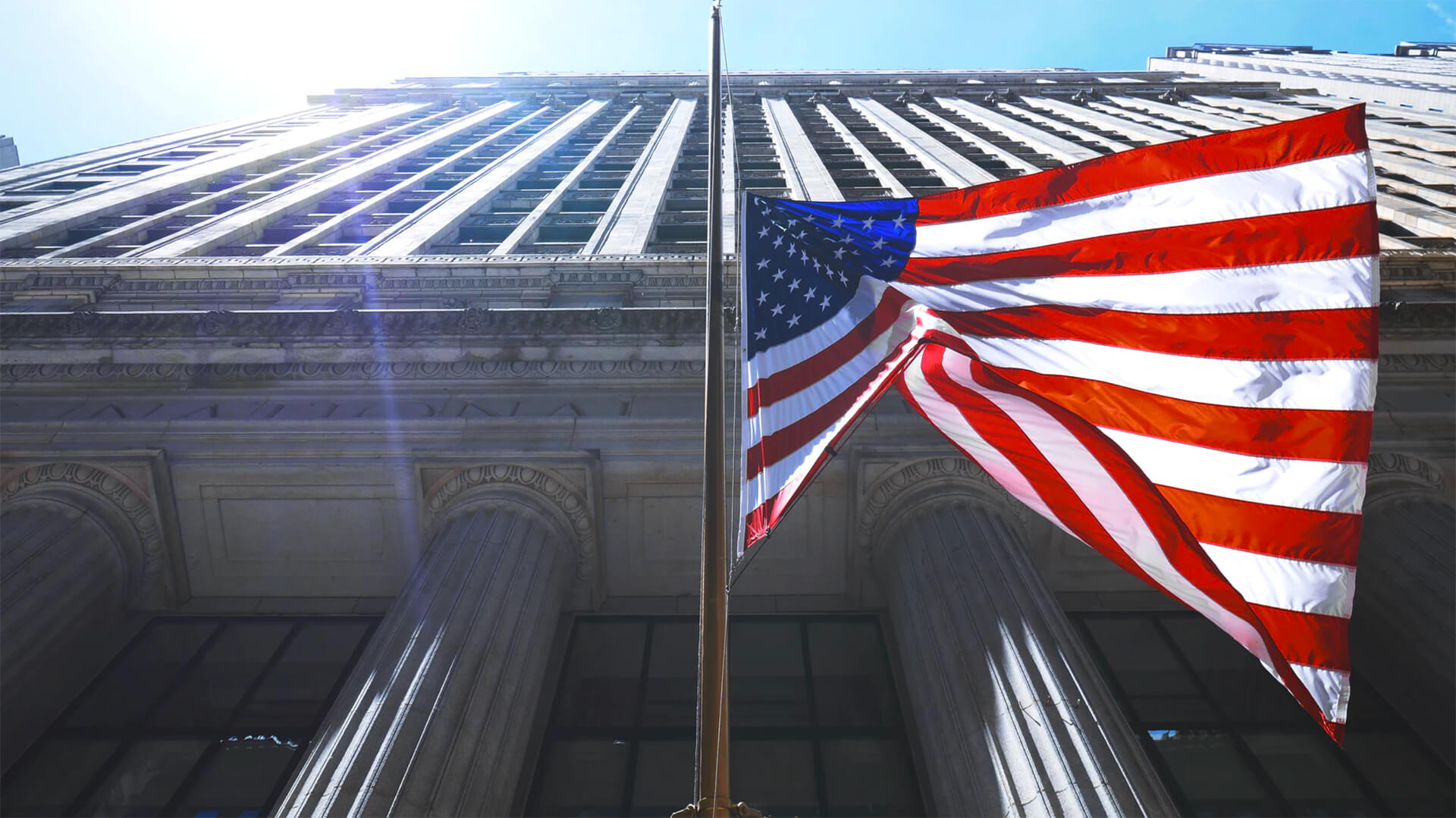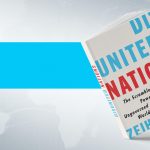Read the other installments in this series:
The CRF Files, Introduction
CRF Files, Part I: The Future of Korea
The Cutting Room Files, Part 2: The Future of Mexico
The Cutting Room Files, Part 3: The Future of Canada
The Cutting Room Files, Part 4: The Future of Japan
The Cutting Room Files, Part 5: The Future of the United Kingdom
The Cutting Room Files, Part 6: The Future of China
The Cutting Room Files, Part 7: Europe
This piece is part of the Cutting Room Files, portions of the upcoming Disunited Nations text that were cut for length. Disunited Nations is available for pre-Order now on IndieBound, Apple Books, Hudson Booksellers, Barnes & Noble, Amazon, Google Play, or Kobo.
I try to avoid US domestic politics in most of my work. In part because domestic politics are a loud and busy space, and it is easy to have your work get lost in the noise and rage. In part because – especially at the primary level – it is mostly fluff that doesn’t move the national needle. In part because Americans are wildly fickle in their views of political leaders and we’re just too early in the process for it to normally be worth my time. In part because I attempt to keep my personal views out of my work as a matter of course, and, as an American and a political independent, the sound and fury seems committed to drowning me.
But mostly it is because US foreign policy since World War II has been nearly lock-step bipartisan. The Americans crafted a global Order to fight the Soviets, and preventing global thermonuclear war tends to encourage unity.
This election cycle is different.
For one, US foreign policy is – for the first time in the life of everyone aged 75 or under – in flux. The Soviet Union collapsed in the early 1990s and America’s long-lived, Order-driven, bipartisan foreign policy overnight became a lot less relevant. America’s subsequent presidents never updated the policy for the post-Cold War age and global structures fell into disrepair. Now, a generation on, it is the American policy of forcing global stability which is collapsing, and it is taking the entire global Order with it. For the first time in decades, an American debate over foreign policy isn’t simply relevant and necessary, it is inevitable. Simply put, for the first time in most of our lives, foreign policy is political.
For two, the United States is utterly incapable at the institutional or national level of having that debate. For the moment, America’s two-party system is off-line. Every generation or two the factions that make up America’s parties shuffle around. Some get stronger. Some get weaker. Some get exiled into the wilderness where they become swing voters. Some factions of swing voters come in from the wilderness and join a party. In previous periods of American political reincarnation the populists of Trumpian extraction used to be Democrats, while African Americans used to be Republicans.
From one point of view this is normal and even healthy. Technology and social mores and economic patterns and security trends all shift with time, and American politics evolve with them – in ways both substantial and unpredictable.
But from another point of view this transition is anything but normal or healthy. While this rejiggering is in progress, the Americans effectively lack functional parties which means the capacity of the US to internally discuss issues of import more or less collapses. That’s triply true for topics – like foreign policy – for which the average American citizen lacks day-to-day exposure. During periods such as this, what passes as foreign policy comes down to the personal charisma, connections and diplomatic skill of the president. Last time around that was one of the American greats: FDR. This time around it has been a pair of men who are somewhat less…great: Barack Obama and Donald Trump.
So with that disclosure and backdrop, let’s dive in:
Over this past weekend the Americans held their third pre-contest for who will get the right to run on the Democratic ticket in November’s presidential elections versus Donald Trump.
Now I have (somewhat strong) opinions about all six of the remaining major candidates, but let me sum the relevant bits in as nonpartisan language as I can manage. (Remember, I’m an independent. I’m an equal opportunity bubble-popper.)
- Former Vice President Joe Biden continues to underperform. The leader in national polls should not be doing so badly. His rankings so far in the primaries are fifth, fourth and a very distant second. Biden’s debate performances have been nothing short of awful and IMO he not going to make it, particularly in an environment where the party radicals are the ones who show up to primaries and caucuses.
- Mayor Pete Buttigieg is an interesting character who is likely to do well…in 2032 and beyond. He’s just too young and too inexperienced and isn’t nearly radical enough to attract the sorts of people who actually show up to these primary votes.
- Senator Amy Klobuchar is another moderate attempting to come from behind, but ultimately she is competing with Biden and Buttigieg for the same limited pool of votes.
- Senators Bernie Sanders and Elizabeth Warren are utterly, hideously, hilariously unelectable in a general election. Sanders isn’t even a Democrat. He only fills out the paperwork to say-so when he’s running for president. It isn’t simply that the pair espouse policies that most Democrats (to say nothing of independents or Republicans) are uncomfortable with. Warren made the mistake of issuing dozens of policy papers in which her apparent non-command of math was made eminently obvious. Sanders never pretended that his policies are bound by the laws of math. (This is the guy who turned what he joked was his honeymoon to the Soviet Union during the Cold War into an anti-US propaganda piece.) But since their politics are the sort that appeal to the sorts of people who show up for primaries, both continue to do well in the polls. Expect one to endorse the other in time (likely Warren backing Sanders) or even a joint ticket.
- Billionaire former New York City Mayor Michael Bloomberg spent more on advertising in the past few weeks than all other presidential hopefuls have on all media markets for the past year. A candidate debate last week was his first appearance in the mix of things. Bloomberg didn’t exactly shine, but since he wasn’t actually on the ballot in Nevada we don’t have any reasonable data to tell us how well (or badly) he is doing nationwide. His latest advertising campaign involves anti-Trump billboards scattered throughout Trump Country saying things like “Trump eats burnt steak (Mike Bloomberg likes his medium-rare)” or “Trump cheats at golf (Mike Bloomberg knows this from playing golf with Donald Trump)”. While the watch-it-all-burn part of me thoroughly enjoys this rhetorical billionaire slap-fight, the key takeaway is not only does Bloomberg have a functionally unlimited budget for the race, but he’s already positioning himself as running against Trump rather than other Democrats.
With Nevada in the rear-view mirror, I feel reasonably confident to make a squishy forecast.
I expect this to go one of two directions, neither of which are good for the mainline Democrats. Both scenarios hinge on Super Tuesday. On March 3, Alabama, Arkansas, California, Colorado, Maine, Massachusetts, Minnesota, North Carolina, Oklahoma, Tennessee, Texas, Utah, Vermont, and Virginia hold simultaneous electoral contests. That’s our pivot.

In scenario 1, the centrists align to prevent a Sanders from gaining the nomination.
This scenario may well be a long shot. Klobuchar continually demonstrates her utter disdain for Buttigieg despite their ideological similarities. Joe Biden repeatedly showcases he is no longer capable, but refuses to step aside. You have to be an egomaniac to run for president, but the degree of disunity among what American independents have taken to calling the “sane” Democratic candidates is striking. Asking them to pull together in a touch over a week is a tall order.
But let’s assume the moderates agree to pool resources or even run some sort of joint ticket. They will face off against Bernie Sanders, and when we reach the party convention in July, we’ll all live through a rehash of the 2016 conventions when Sanders faced off against moderate Democrats…and lost.
But this time it’s different. No matter how intriguing you find the concept of a President Amy or Pete, they lack the force-of-nature and political-machine qualities of Hilary Clinton. More likeable? Certainly. More electable? Perhaps. But absolutely less recognizable or powerful. They would cut far weaker figures in July.
Perhaps more importantly, this time Bernie isn’t alone. The general breakdown of the Democratic Party in recent years has spilled into Congress, with Sanders now having a plethora of high-visibility allies. Between a weaker moderate wing and a stronger radical wing, the party will split down the middle no matter who receives the nomination.
In scenario 2, Bloomberg does well enough on Super Tuesday to eclipse the Buttigieg/Klobuchar/Biden crowd and proceeds to the convention as one of the top two candidates. We then have a face-off between Sanders, who rallies against money in politics and institutional interests committed to “stealing” the nomination, and Bloomberg, who is only a contender because of the money he’s put into politics and who in essence is looking to steal the nomination. Once again, the party splits down the middle. This time with folks like Biden or Klobuchar or Buttigieg – you know, the “normal” people who we have all thought of as “Democrats” for the past several decades – barely part of the conversation.
In either scenario, either Sanders loses the nomination and attempts to sink the party, or Sanders wins the nomination and political independents (and a not insignificant number of moderate Democrats) hold their noses and vote for Trump (assuming they show up at the ballot box at all).
The point is not that Trump is the odds-on favorite to win the election (although if I were a betting man, that’s what I’d put my money on). The point is that this primary process is the end of the Democratic Party as we know it. How long will it take to reform with a new set of factional alliances? History suggests 8-12 years.
For those of you reading this who consider yourself Republicans, curb your enthusiasm. Your party died over three years ago with the nomination of Donald Trump, a then-candidate who considered three of the core Republican factions to be ideological foes: fiscal conservatives, national security conservatives and business conservatives. If you consider yourself a member of one of those sub-groups, your party is gone – reduced to being a sort of personal vehicle for the sitting president. I’d argue the most significant outcome of the 2018 mid-term elections was those factions’ near-wholesale ejection from the House of Representatives and their replacement with TeamTrump members.
Both parties are now nonfunctional. The Democrats are shattering along jagged, ideological lines. The Republicans have been hijacked by their equivalent of Bernie Sanders. We’ve been here before. We’ll get through it. It just takes a roughly decade-long transition period. The Democrats are starting now. The Republicans started three years ago.
But there’s something else going on right now that we’ve been through before that is likely to make this transition to our new normal even messier, and to have far more dangerous international implications.
It has to do with how we manage and transmit information.
Before the 1980s every American newspaper of even moderate size maintained a series of offices around the world to investigate, report and generate news as a matter of course. These foreign bureaus were the backbone of the American media presence globally.
But in the 1980s the fax machine, and in the 1990s email, gutted those bureaus. No longer were editing or copy-editing or research staff required on site. Instead a handful of reporters (still stationed at the bureaus) could simply communicate with the home office for support work.
Then came file attachments. Suddenly the bureaus were not needed at all and the reporters became de facto freelancers with no foreign office support. If you had a dial-up modem, you were the bureau.
Then came algorithms and the Internet. At home such advances jacked up productivity, and so necessitated fewer staff to handle tasks like editing. Fewer people by default meant a poorer collective memory which both made for thinner stories and less capacity to call “bullshit” on bad or inaccurate ideas. Abroad such technologies started scraping foreign news stories from foreign sites directly; stringers went away.
The new face of media is one of fewer and fewer bureaus with fewer and fewer staff at higher and higher cost. Not exactly a recipe for deep, quality-driven, context-heavy, investigative work. Newer algorithms and early-AI are now even writing a few stories here and there, slimming down the already rail-thin institutions that remain. From 1975 to 1995 network coverage of foreign news fell by two-thirds. Since then it has more or less fallen off a cliff.
And there’s the not-so-minor issue of time. Magazines had a production cycle of a week or more. Newspapers a day or more. The 6-o-clock news at least a day. There was time to peer under rocks and tease out details. Online media publishes the heartbeat the quick-take is completed, and no one reads the retractions (in part because no one can find them).
If there are few to no employees living abroad, and if computers are doing the heavy lifting, and if there is no context or institutionalized knowledge, then most of what remains is opinion. Shrill, screamed, uninformed, opinion. Add in social media and much of our information feeds today are distilled with a hatchet down to a Facebook post or something that can be transmitted in fewer than 289 characters.
It is nearly blasé to now say that social media has become a problem in American politics. By reducing the cost of not simply contributing to, but initiating, a political conversation to zero, we are now subject to an onslaught of voices ranging from the crazy cousin we all avoid to Russian propaganda as a matter of course. This is wretched for institutional parties who can no longer control fundraising and messaging. This is fantastic for folks in the political wilderness who now face few barriers to entry (e.g. Donald Trump and Bernie Sanders).
This isn’t an American phenomenon, but is instead global. Arguably the United Kingdom’s BBC has gone furthest down this road and is now a pitiful shell of its former glory. Canada’s CBC isn’t far behind and IMO ranks slightly below the American majors in terms of (lack of) quality. France24 is probably the Western institution that has fought off these trends most effectively, although even there the drop in excellence is obvious. Of the global news services Al Jazeera is the company making the best effort at providing what we used to think of as good global reporting (which is hardly to say AJ has no biases).
Now, like I said, we’ve been here before.
The last time the world wrestled with a new technology that reduced the costs of information flow, it was the telegraph and telephone. Then, like now, we had no legal tools for regulating what people could and could not say in the public domain. Slander became omnipresent, particularly in politics. Congress was of questionable effectiveness, and ultimately it fell to the Supreme Court to force a nationwide standard for libel. Media became responsible for the accuracy of what they printed.
Something like that is inevitable for today’s social media too. We’ll get through this. The question is, how long will that take? And, what will we break between here and there?
Last time, the Supreme Court didn’t act until it became clear Congress wouldn’t: 1964. I have some confidence it will be quicker this time around because the holes in our system are so obvious and what’s left of both parties agree on the core issue (even if they define the problem differently). Not to mention faster information flow works on the Supreme Court just as effectively as it does on the rest of us.
As to breakage, I’m far more concerned. The last time around the shift from road to rail reduced travel times by an order of magnitude while the telegraph and telephone enabled immediate communication. Journalists were able to report in near real time, putting a premium on sensationalism. Journalists of the yellow sort simply made stuff up. One of those fabrications charged the Spanish with blowing up the USS Maine, which led directly to the United States declaring war on the Spanish Empire.
Back then, the United States had a functional political system, was a military laggard in an imperial world, and really, seriously cared about international blowback from its actions. Today, the Americans’ foreign policy is a one-man show, its navy is more powerful than everyone else’s combined, the world is dependent upon the American security position, and Americans lack the institutional capacity both in politics and the media to even have basic awareness about the world.
This could well be imminent. This worries me. Greatly.
For a look at what is possible and probable with US foreign policy in the next two decades or so, I refer you to something else that is imminent: the release of my new book – Disunited Nations: The Scramble for Power in an Ungoverned World. I’ve got a whole chapter for you on how the Americans’ political rewiring collides with a global collapse to make for something fundamentally new.
Disunited’s release is on, heh, Super Tuesday.









